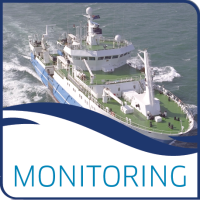Ocean Acidification : A Baseline Study assessing seasonal and inter-annual varability of carbonate chemistry in Scottish Waters.
The chemistry of the seawater carbonate system is complex, an imbalance as a result of absorption of atmospheric CO2, by oceans, has the potential of making them more acidic reducing carbonate ion availability. Since the industrial revolution the pH of seawater has fallen by 0.1 (concentration of hydrogen ions in seawater has increased by 30%). Although the input of CO2 from the atmosphere has only small spatial variation, some marine regions will be more rapidly affected. It is therefore important to establish natural variations by routine monitoring before changes due to anthropogenic inputs can be assessed. There are four parameters of the marine carbonate system which can be measured directly; total alkalinity (TA), pH, carbon dioxide fugacity (fCO2) and dissolved inorganic carbon (DIC). Measurements of any two components allow the concentration of the other two to be calculated. A Marianda Vindta 3C instrument for the analysis of TA and DIC has been commissioned. and validation of the method performed to determine within and between accuracy and precision. Water samples were collected on a weekly basis from the Stonehaven long term monitoring site along with samples from two hydrographic cruises (May& December 2014) and in the vicinity of the Mingulay cold water corals (January 2015). An initial assessment of the coastal dataset showed strong seasonal variability linked to phytoplankton growth and nutrient uptake, pH has remained consistent at both sampling depths maximising during the summer months. The CaCO3 saturation state (?) was determined and found to be >1 for both calcite and aragonite at both depths (1 and 45 m) for all years, indicating that the waters are supersaturated and organisms should be able to calcify.
Data and Resources
- Ocean Acidification Baseline Study - East Coast Scotland 2008-2013csv
Column Headings:
Station Name
Preview Download
Station...
| Field | Value |
|---|---|
| Publisher | |
| Modified | 2020-08-04 |
| Release Date | 2020-08-04 |
| Identifier | 186b709e-f70b-4383-88b8-14143c9e4ac9 |
| Temporal Coverage | 2008-11-26 to 2013-12-03 |
| Language | English (United Kingdom) |
| License | UK Open Government Licence (OGL) |
| Data Dictionary | Since November 2008 seawater samples have been collected at a long term coastal monitoring site in the North East of Scotland (Stonehaven) on a weekly basis for TA and DIC analysis. Water samples collected between 2008 and August 2011 were collected and analysed as part of the Defra PH project and UK Ocean Acidification project. Samples collected since Sept 2011 have been analysed as part of this research project. |
| Contact Name | Marine Scotland |
| Contact Email | |
| Public Access Level | Public |


